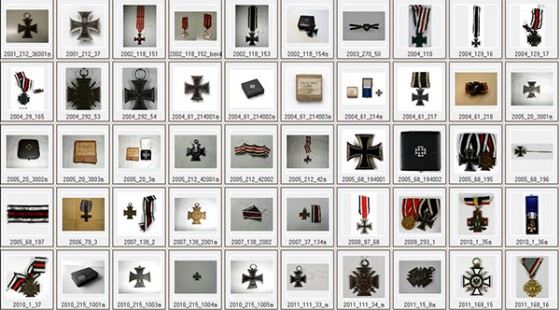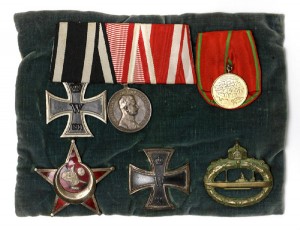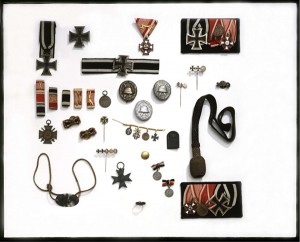The Jewish Museum is located in the well-known Berlin neighborhood of Kreuzberg, which is also home to a 66-meter high hill that gave the district its name in 1920: Kreuz meaning ‘cross’ and Berg ‘mount’ or ‘hill’. A monument designed by Friedrich Schinkel had been erected there about 100 years prior in memory of the war of liberation from Napoleon. On top it has always been bedecked with an Iron Cross. Prussian King Friedrich Wilhelm III first endowed the building of the monument 200 years ago, on 10 March 1813, the birthday of his late Queen Luise. A drawing of Schinkel’s design for the Iron Cross has been passed down to the Kupferstichkabinett’s collection (Museum of Prints and Drawings). In 1870 and 1914 respectively, Emperors Wilhelm I and II made subsequent endowments of the Iron Cross for particular service by German soldiers.
Numerous Iron Crosses can be found in the Jewish Museum’s collection, in many cases together with the respective certificates.

Iron Crosses in Kreuzberg – view of the object data bank of the Jewish Museum
© Jewish Museum Berlin
They nearly all date from the time of the First World War, in which around 100,000 Jewish soldiers participated on the German side. Among them were Julius Fliess (1876-1955) and Max Haller (1892-1960), whose medals are now in the Jewish Museum’s possession.

Medals given to Max Haller (1892-1960), 1915-1918
© Jewish Museum Berlin, gift of I. Dinah Haller, photo: Jens Ziehe
A special variety of Iron Cross was known as the “Cross of Honor”. President of the Reich Hindenburg bestowed them in July of 1934 – on the occasion of the 20th anniversary of the beginning of World War I – on former soldiers and the widows and parents of fallen soldiers. In the C.V. Newspaper, a weekly of the Jewish press with a high circulation, an article about the Cross of Honor from 19. July 1934 elaborates:
“… The German Jews to whom the conditions of the bestowal applies, but indeed all German Jews, will bear the Cross of Honor with pride and will thus keep the memory of their participation in a great era of collective German history alive.”
Twenty Crosses of Honor from the years 1934-1937 are now in the Jewish Museum’s collection. Bit by bit in the coming months they will be made accessible to the public, together with biographical information on their one-time recipients, in the online databank of the Jewish Museum.

Medals given to Julius Fliess (1876-1955), 1914-1918
© Jewish Museum Berlin, gift of Dorothee Fliess, photo: Jens Ziehe
In the memory of German-Jewish families – especially for the children of participants in the war and for those who have made familial bequests – the stories and the preservation of material legacies from the First World War have great significance. Frequently these memorabilia are offered to the museum as the primary, and sometimes only, surviving object of a family’s history. In many conversations with donors, World War I was and remains a central theme. The stories about it are always intertwined with the later catastrophe and, for us, chronicling the era is a key concern.
I can still vividly recall an encounter I had in my office in the Libeskind Building on 28. September 2000, one year before the museum opened. An elderly lady, native of Berlin now living in Sydney, told me about her father, a highly decorated participant in World War I and member of the Reich’s league of Jewish front-line soldiers. On that very day in the year 1938, as the family prepared to leave Germany for Australia, he went with his daughter for the last time to the Berlin park of Tiergarten. There, weeping, he threw his Iron Cross into the river Spree. This moment etched itself indelibly on his daughter’s memory, and she spoke about it 62 years later as if it were yesterday.
Leonore Maier, Collections
My grandfather, Jakob Weitzenkorn, won an iron cross in the Franco-Prussion War. I have a photo of him wearing the cross. I had also been told that he was the only jew to win the cross in that war, and that this had once been referenced in a book. I have not been able to find any reference to Jakob Weitzenkorn and the iron cross. Can you help me?
Thank you very much,
Norma Weitzenkorn Kahn